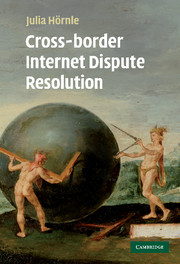Book contents
- Frontmatter
- Contents
- List of illustrations
- List of tables
- Table of cases
- Table of UK statutes
- Table of UK statutory instruments
- Table of European Communities legislation and documents
- Table of foreign statutes
- Table of treaties and conventions
- Acknowledgements
- List of abbreviations
- 1 Introduction
- 2 The concepts of fairness
- 3 Internet disputes
- 4 ADR and applicable law
- 5 ODR and access
- 6 Arbitration and due process
- 7 Internet disputes and fair arbitration
- 8 A model of dispute resolution for the Internet
- Bibliography
- Index
- References
5 - ODR and access
Published online by Cambridge University Press: 30 November 2009
- Frontmatter
- Contents
- List of illustrations
- List of tables
- Table of cases
- Table of UK statutes
- Table of UK statutory instruments
- Table of European Communities legislation and documents
- Table of foreign statutes
- Table of treaties and conventions
- Acknowledgements
- List of abbreviations
- 1 Introduction
- 2 The concepts of fairness
- 3 Internet disputes
- 4 ADR and applicable law
- 5 ODR and access
- 6 Arbitration and due process
- 7 Internet disputes and fair arbitration
- 8 A model of dispute resolution for the Internet
- Bibliography
- Index
- References
Summary
I have a spelling checker
It came with my PC;
It plainly marks for my revue
Mistakes I cannot sea.
I've run this poem threw it,
I'm sure your pleased too no,
Its letter perfect in it's weigh,
My checker tolled me sew.
(Janet Minor, US poet)Introduction
This chapter looks at online forms of mediation and arbitration and variants of the main forms of ADR and how they have been transformed by ODR. This chapter essentially focuses on the online dimension of extra-judicial dispute resolution, defining the meaning of the phrase ‘online dispute resolution’ and its significance for the fair resolution of Internet disputes. This chapter explains the different forms of ODR and the technology currently being used or developed for dispute resolution. Its main argument is that ODR is more than mere online ADR. The technology has a transforming effect – it makes dispute resolution for Internet disputes more effective and hence more accessible, thus contributing to fairness.
Definition of ODR
The adjective ‘online’ refers to the use of computer and Internet technology, best described by the phrase ‘information and communications technology’ (ICT). ODR is therefore dispute resolution carried out by combining the information processing powers of computers with the networked communication facilities of the Internet. For the purposes of this book, the following simple and short definition is proposed: ‘ODR is a collective noun for dispute resolution techniques outside the courts using ICT and, in particular, Internet applications.’
- Type
- Chapter
- Information
- Cross-border Internet Dispute Resolution , pp. 74 - 90Publisher: Cambridge University PressPrint publication year: 2009
References
- 1
- Cited by



